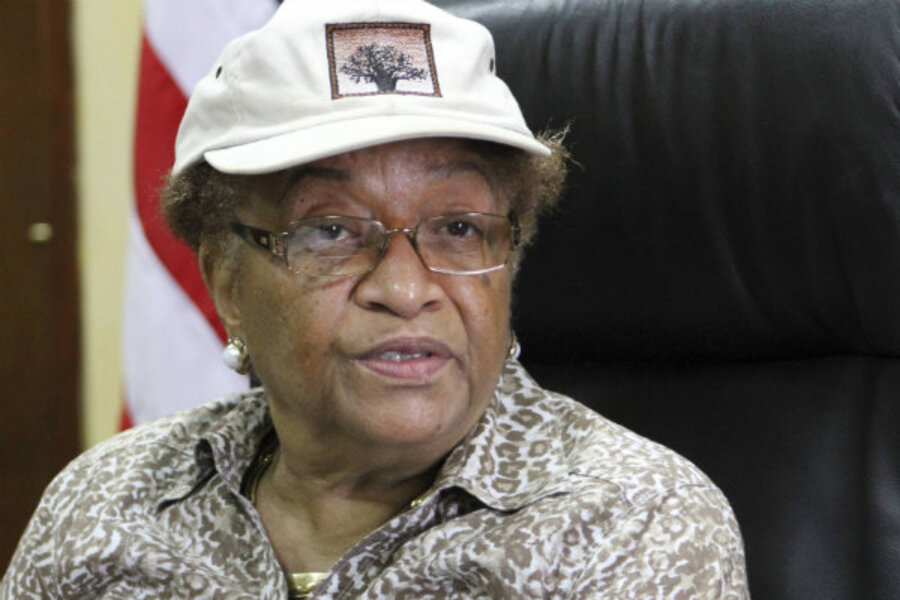Liberia’s civil war ended 10 years ago, closing one of the most brutal chapters in human history. One in 4 Liberians was displaced or killed. Instances of cannibalism epitomized the inhumanity as Liberia became an archetype of anarchy, greed, and evil.
Today, Liberia may be the most remarkable postconflict success story of the modern era – thanks to smart US foreign policy and the Liberian people’s choice of peace over war. But a dangerous paradox threatens to unravel the country’s hard-won gains: Despite the progress, central drivers of violence remain. The war has ended, but underlying social and economic tensions continue – as is likely to occur in other countries affected by civil war, from Syria to Libya to Congo.
The unresolved issues in Liberia boil down to three interrelated challenges – exaggerated in perception, but grounded in fact – that have polarized Liberia since its founding in 1847: elite dominance over the majority indigenous population; the mutual disconnect between the capital, Monrovia, and the rest of the country; and lack of trust in government. If left unaddressed, this cocktail promises future instability.
Acting now is critical. Patience wears thin, particularly among Liberia’s volatile youth, amid an environment of increasing national discontent, selfish politicking, widening economic inequality, and regional fragility.
Over the past decade, Liberia’s successes are a model of postconflict transformation and US engagement abroad. Truly stabilizing this steadfast ally in a historically bad neighborhood – on the doorstep of West Africa’s recent extremist-led instability from Mali to Nigeria – leverages past investments and is smart, long-term policy. This requires doubling down on Liberia’s progress.
And the progress cannot be overstated.
Today, where drug-addled child soldiers once roamed, US-trained troops respond competently when called to action, most recently sending a peacekeeping platoon to Mali.
Future child scholars, not child soldiers, attend free and mandatory primary school. Illiteracy, which once soared above 80 percent, is decreasing thanks to US-sponsored programs.
The economy is rebounding after shrinking by 90 percent, and government coffers have increased more than 1,000 percent since 2003, when the national budget equaled that of the public school district in Carthage, Mo.
Countrywide immunizations and health-care services – with major US support – have halved mortality for children under age 5.
Long-absent electricity illuminates homes and businesses; President Obama’s Power Africa initiative promises even more. Smooth roads have replaced cratered streets. New buildings stand in place of bullet-riddled wrecks.
Such a turnaround is historically rare and unambiguously impressive.
Nevertheless, common street wisdom is that corrupt elite in Monrovia use personal connections and government positions to exploit the indigenous people throughout the country. The elite – often and incorrectly perceived to be solely descendants of the freed American slaves that founded Liberia – benefit from peace, while the masses remain impoverished and disempowered. This perception encapsulates the three interrelated challenges that must be overcome.
First, the deepest roots of Liberia’s conflict – the freed slaves’ original dominance over the indigenous majority by barring them from owning property, voting, or otherwise participating in government – lives on in Liberia’s collective memory and outmoded laws, even if not in practice. To many, an exceptionally rankling reminder of this exclusion is Liberia’s motto: The Love of Liberty Brought Us Here.
Second, distrust and misunderstanding continue to characterize the relationship between Monrovia and the rest of the country after warlords and political entrepreneurs exploited the countryside, where two-thirds of Liberians live. The infamous use of blood diamonds by former Liberian President Charles Taylor – convicted last year in The Hague of war crimes and crimes against humanity – epitomizes the predatory state-society relationship.
Third, government is not seen as the source of public goods and services, but as the most reliable source of income, if one is fortunate enough to get a job through the right connections. Corruption is endemic – 75 percent of Liberians recently polled admitted paying a bribe to an official over the past 12 months. In Liberian vernacular, a word for an intelligent, savvy person is “crook,” which has no negative connotation.
In the immediate aftermath of war, it was sensible to build the hardware (tangible goods, such as roads, schools, and clinics) before tackling the software (these deeper societal rifts). The basics were badly needed and provided the war-scarred populace with visible progress.
But now is the time to focus on the software. The path forward is complex, but essential steps are clear. Liberia must harmonize and update the legal and constitutional code to reflect the values of the Liberian people, strengthen the justice system, accelerate the process of political decentralization to give all Liberians a voice, and increase transparency and accountability.
Liberian government leadership is required. However, such critical societal issues can only be addressed adequately with full participation from civil society, traditional leaders, the legislature, and the larger public.
That these are Liberian challenges requiring Liberian solutions, however, does not mean the international community has no role.
To the contrary, external support – and, at times, pressure – is crucial, particularly from the United States, both bilaterally and in conjunction with the United Nations. Addressing such foundational issues will challenge vested interests, touch political third rails, and require hard compromise. This is when Liberia needs friends most.
Benjamin J. Spatz is a fellow at the Truman National Security Project. He previously served as a consultant with the UN Panel of Experts on Liberia, special adviser to the government of Liberia, and with the UN in Liberia.
Source link : https://www.csmonitor.com/Commentary/Opinion/2013/0923/Liberia-a-remarkable-African-success-story-still-needs-help
Author :
Publish date : 2013-09-23 07:00:00
Copyright for syndicated content belongs to the linked Source.
